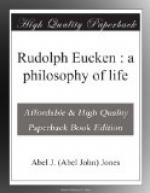The negative movement, then, is the first substantial step in the progress of the spiritual life. The man’s self breaks out into discontent with nature, and this is the first step to the union of self to the higher reality in life. The break with the world is in itself of course but a negative process. This must attain a positive significance. If the self breaks away from one aspect of life, it must identify itself more intimately with another. This occurs when the individual sets out definitely on a course of life in antagonism to the evil in the world.
When this takes place, there arises within him a new immediacy of experience. Hitherto the things that were his greatest concern, and that appealed to him most, were the pleasures of the natural world. But these things appeal to him no longer as urgent and immediate—but as being of a distinctly secondary character. A new immediacy has arisen; it is the facts of the spiritual world that now appeal to him as urgent and immediate. “All that has hitherto been considered most immediate, as the world of sense, or even the world of society, now takes a second place, and has to make good its claim before this spiritual tribune.... That which current conceptions treat as a Beyond ... is now the only world which exists in its own right, the only true and genuine world which neither asks nor consents to be derived from any outside source.”
This new immediacy is the deepest possible immediacy, it is an immediacy of experience where the self comes into contact with its own vital principle—the Universal Spiritual Life—and brings about a fundamental change in the life of the individual. The inner life is no longer governed by sense impressions and impulses, but the outward life is lived and viewed from the standpoint of the inward life.
But a new immediacy is not all that follows in the train of the negative movement—on the contrary, the highest possible rewards are gained, for freedom, personality, and immortality are all brought within the range of possibility.
Once a human being decides for the highest he is on the highroad to complete freedom. The freedom is not going to be won in a moment, but must be fought for by the individual through the whole course of his life. His body is always with him, and will at times attempt to master him—he must fight continually to ensure conquest. Difficulties will arise from various quarters, but he is not going to depend only upon his own resources. All his activity involves in the first place the recognition of the spiritual world, but more than this, he appropriates unto himself of the spiritual world—this in itself is an act of decision. And the more we appropriate unto ourselves of the Universal Spiritual Life, the more we decide for the higher world, the freer we become. Indeed, “it is this appropriation ... of the spiritual life that first awakens within the soul an inward certitude, and makes possible that




